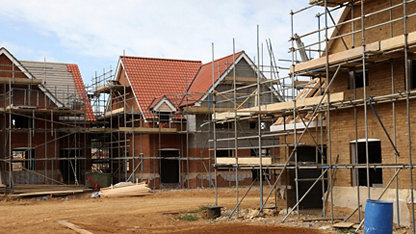Planning rules can often change during times of crisis to help communities recover from economic turmoil.
With the COVID-19 pandemic things have been no different, with countries responding in different ways in to protect jobs and mitigate the economic damage caused by lockdowns.
Across the world the planning rulebook – i.e. the way we use and protect land as a valuable resource – is being rewritten to reflect our ability to work and live, but at what cost?
The home office or office home?
Protecting the amenity of people’s private homes has typically been afforded the highest value in planning systems around the world.
No other activity is usually permitted in this use class and for good reason: people should be allowed to live their lives at home free from negative factors such as noise, waste and fumes that might have been generated from other nearby economy activity.
The problem is for the last four months millions of office workers have now decanted into those very homes.
In land use regulation terms, one of the most protected uses – residential – has now seamlessly converted into commercial use.
Without an ability to enforce against such a rapid transformation in our work/life balance – the protections afforded to residential properties by the use class system have been effectively rendered mute.
Home workers are getting used to their new way of being economically productive – a RICS survey with Leesman of up to 10,000 workers found that nearly 80% believe being at home helped productivity.
With a growing desire for home workers to stay put after the impact of COVID-19 diminishes, it suggests there might be longer term ramifications for use classes than governments might have first realised.
Valuing property
More importantly, use class protections not only guarded against incompatible uses being located alongside each other, they also effectively distributed value, guiding our professionals and developers whilst giving investors in the marketplace certainty.
The loosening of use classes could result in a redistribution of property asset values and property tax receipts.
While this represents a significant shift for the market when it comes to property valuation, the full extent of its impact won’t be apparent until much of the COVID-19 crisis is over and whether the ‘new normal’ sticks or we simply return to the old ways of working.
The restaurants are taking over
The lockdown and the evolving concept of social distancing presented operators in the food and beverage sector a specific challenge: how to use their space to serve customers safely while being able to make money.
Whether it’s two meters or one, it has been difficult for businesses to seat the same number of people in an enclosed space and comply with the rules.
In response, governments have torn up restrictions which have allowed restaurants and cafés to take over vacant streets and pavements – the world has seemingly caught up with places like Amsterdam and Paris which already allow their businesses to inhabit outdoor public spaces, and socialise safely.
In Houston, USA, the City Council are due to discuss a proposal from their Chief Transportation Officer to open vacant tarmac to what they call ‘parking lot dining’ – allowing nearby restaurants to seat customers while the pandemic is taking place.
While many of the measures to relax the use of outdoor space in order to support food and drink operators are temporary, millions of diners are now getting used their alfresco ‘new normal’ and, with the support of communities and customers , could result in these being made permanent.
Traditional Vs. Online Retail
Traditional bricks and mortar retail outlets have struggled in recent years, whether you’re a shopping mall in the United States or a boutique shoe shop in Sydney. COVID-19, and the subsequent lockdowns, have accelerated this trend. With shops shut, online sales boomed as companies with large warehouses shipped the goods customers wanted.
Could strengthened land use controls help protect bricks and mortar retail? Demand for ecommerce seems unlikely to reverse entirely, but governments are starting to consider new restrictions on warehouse space – alongside other measures like online transaction taxes – as a part of a plan to give traditional retail more of a level playing field once the crisis has passed.
Conclusion
COVID-19 has challenged the way we think about planning and land use.
With talk of a ‘new normal’ and working from home culture, there will need to be a debate about the long-term purpose of use-class protections in countries where large populations eat, live, work and sleep in the same room for 365 days a year.
While working from home may be desirable for some right now, a significant part of the global workforce do wish to return to their office spaces – which might be down to a desire to separate work from home – something which use classes were designed to do in the first place.
However, when designing homes the industry will now need to take into account their growing role as workspaces, with potentially far reaching implications for how we arrange our city centres, our suburbs and neighbourhoods.
Key takeaways
- The robustness of use class protections have been challenged thanks to COVID-19 as home working grows, which could result in a redistribution of property asset values and property tax receipts. Though not fully revealed at this early stage it will be closely watched by, investors, developers, building owners and tenants.
- Operators in the food and beverage sector should take advantage of a temporary relaxation on outdoor restrictions; a new normal focused on alfresco dining might inspire communities to support a longer-term approach to the use of outdoor spaces after the pandemic passes.
- The problems already plaguing traditional retail have been exacerbated by COVID-19. Controlling land use to prevent new warehouses or online-only distribution centres may be something governments use to reset the marketplace
About the author

Tony Mulhall MRICS
Associate Director Land Professional Group, London, UK, RICS
Tony Mulhall is responsibile for the Planning and Development Professional Group, which has 22,000 members worldwide. As a chartered surveyor and town planner he worked across planning and property disciplines in both the public and private sectors. He graduated in Surveying and Planning in Dublin and also holds Masters degrees from the University of York and from Cass Business School, City University, London.

















